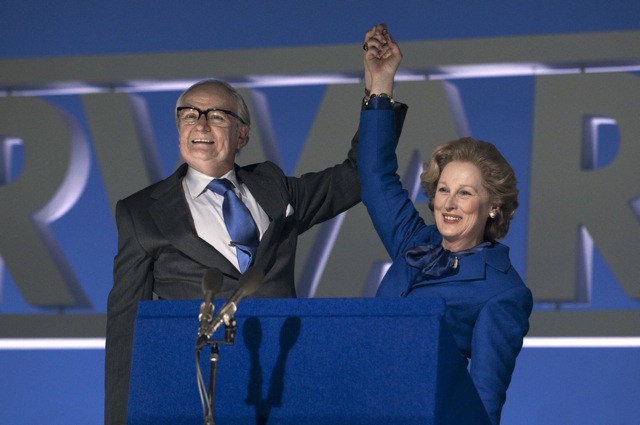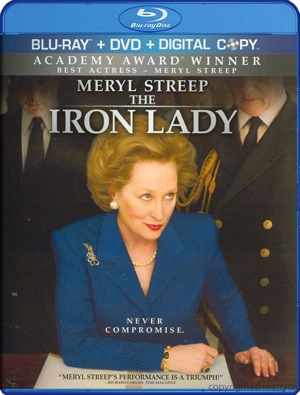CHICAGO – In anticipation of the scariest week of the year, HollywoodChicago.com launches its 2024 Movie Gifts series, which will suggest DVDs and collections for holiday giving.
Blu-ray Review: ‘The Iron Lady’ Wastes Meryl Streep’s Brilliant Portrayal
CHICAGO – The best scene in Phyllida Lloyd’s biopic, “The Iron Lady,” takes place in a doctor’s office as former Prime Minister Margaret Thatcher insists that she’s doing perfectly well, thank you very much. The bullheaded determination that fueled her spectacular success and garnered a fiery backlash has now manifested itself in her elderly years as a warm but firm stubbornness.
As Thatcher, Meryl Streep performs Olympian miracles with the dialogue, allowing her wistful passion to shine through her fatigued frustration. The ever-immersive actress vanishes behind the makeup of her longtime collaborator, J. Roy Helland, and the remarkable prosthetics of Mark Coulier (all three earned well-deserved Oscars for their efforts). When the doctor asks how she’s feeling, Thatcher delivers a disgruntled monologue about how modern society cares more about feelings than thoughts and ideas. A sudden interruption to their conversation provides an out for Thatcher, and Streep brings exquisite comic timing to the line, “Answer that—might be someone who needs you.”
 Blu-ray Rating: 2.5/5.0 |
There’s no question that Streep deserved her much-belated third Academy Award for this incomparable portrayal. Each one of her scenes would look great in an Oscar reel. The problem is that there has been little to no effort made on the part of screenwriter Abi Morgan and director Phyllida Lloyd to connect these scenes or probe them for any tangible meaning. Thatcher’s controversial political career is left offscreen, aside from a series of frenzied “greatest hits” montages that play like a very bad imitation of subpar Oliver Stone. Most of the screen time is devoted to scenes of a senile Thatcher stumbling in the shadows of her flat while having droll exchanges with the ghost of her late husband (Jim Broadbent). He’s credited with preserving his wife’s sanity during her stressful years in office, but the relationship is used to sentimentalize the subject matter rather than illuminate it.

Jim Broadbent and Meryl Streep star in Phyllida Lloyd’s The Iron Lady.
Photo credit: Alex Bailey, Courtesy of Pathe Productions Ltd/The Weinstein Company
Like Nora Ephron’s equally trite “Julie & Julia,” “The Iron Lady” reduces a fascinating woman to a one-note symbol for her gender. Morgan’s message appears to be, “Thatcher was a woman uncompromising in her beliefs. Some people didn’t like what she did, but she stuck to her guns anyway. Hooray!” Such an oversimplification is flat-out shameful. This script is so generic that it could’ve easily been about Sarah Palin (another woman who infiltrated the male-dominated world of politics), and some of the dialogue in its final act sounds strikingly similar to HBO’s “Game Change,” such as when Thatcher is scolded with the line, “It’s not about you, it’s about the party.” A double feature of this candy-colored portrait with Steve McQueen’s galvanizing IRA hunger strike drama “Hunger” would be quite an eye-opener.
Lloyd previously directed Streep in what many critics regard as the actress’s worst film to date, 2008’s hideously chintzy big screen adaptation of “Mamma Mia!” Yet some positive aspect of the experience must’ve compelled Streep to tackle this formidably demanding role at the service of such half-baked material. Once again, she removes any shadow of a doubt that she is indeed the greatest film actress since Katharine Hepburn, but even her sublime nuances are not enough to redeem this film’s utter lack of curiosity about its own subject. Thatcher’s public spending cuts and Reagan-approved privatization tactics have troubling relevance in modern politics, but Lloyd and Morgan would rather not have the audience focus on such unpalatable details. This movie is about a sweet old lady who set out to make a difference and dog gone it, she did, all the while spewing cookie cutter wisdom like, “It used to be about trying to do something, now it’s about being something.” That line is, in itself, a succinct critique of the film. Think about it.
 The Iron Lady was released on Blu-ray and DVD on April 10, 2012. Photo credit: Anchor Bay Entertainment |
“The Iron Lady” is presented in 1080p High Definition (with a 2.35:1 aspect ratio), accompanied by English and Spanish subtitles, and is available in a combo pack equipped with a Blu-ray, DVD and digital copy of the film. The central extra is as underdeveloped as the film itself: a paltry 12-minute featurette that offers zero insight into the filmmakers’ view of Thatcher. Lloyd admits that contrary to her film’s depiction, there were a few other female members of parliament accompanying Thatcher during the 60s. Yet the director decided to make Thatcher the sole woman in order to visualize her isolation. In yet another instance of shameless self-promotion, The Weinstein Company has cobbled together a documentary in which experts line up to address the historic importance of middling Oscar bait such as “My Week With Marilyn” and “W.E.” (Michel Hazanavicius’s big winner, “The Artist,” is the one notable exception in terms of quality). Its segment on “The Iron Lady” includes a single enlightening factoid: the origin of the film’s title.
Four shorter mini-docs are largely comprised of recycled footage from the 12-minute featurette, such as a sound bite interview with Alexandra Roach, the uncanny Streep lookalike who plays the young Thatcher. Roach’s comment about wanting to “get audiences to like Maggie” may sound harmless but it provides a key to this film’s shortcomings. Similarly, Lloyd curiously likens Thatcher to a “tragic heroine in an opera.” These comments are indicative of the filmmakers’ misguided goal. They want audiences to like Thatcher instead of explore the complexities of her character. Insufficient substance is desperately compensated by nostalgic warmth reflected in a score that telegraphs every intended emotion like a cheap melodrama. “The Iron Lady” is a film awash in feelings that could’ve benefited from a few more thoughts and ideas.
 | By MATT FAGERHOLM |


